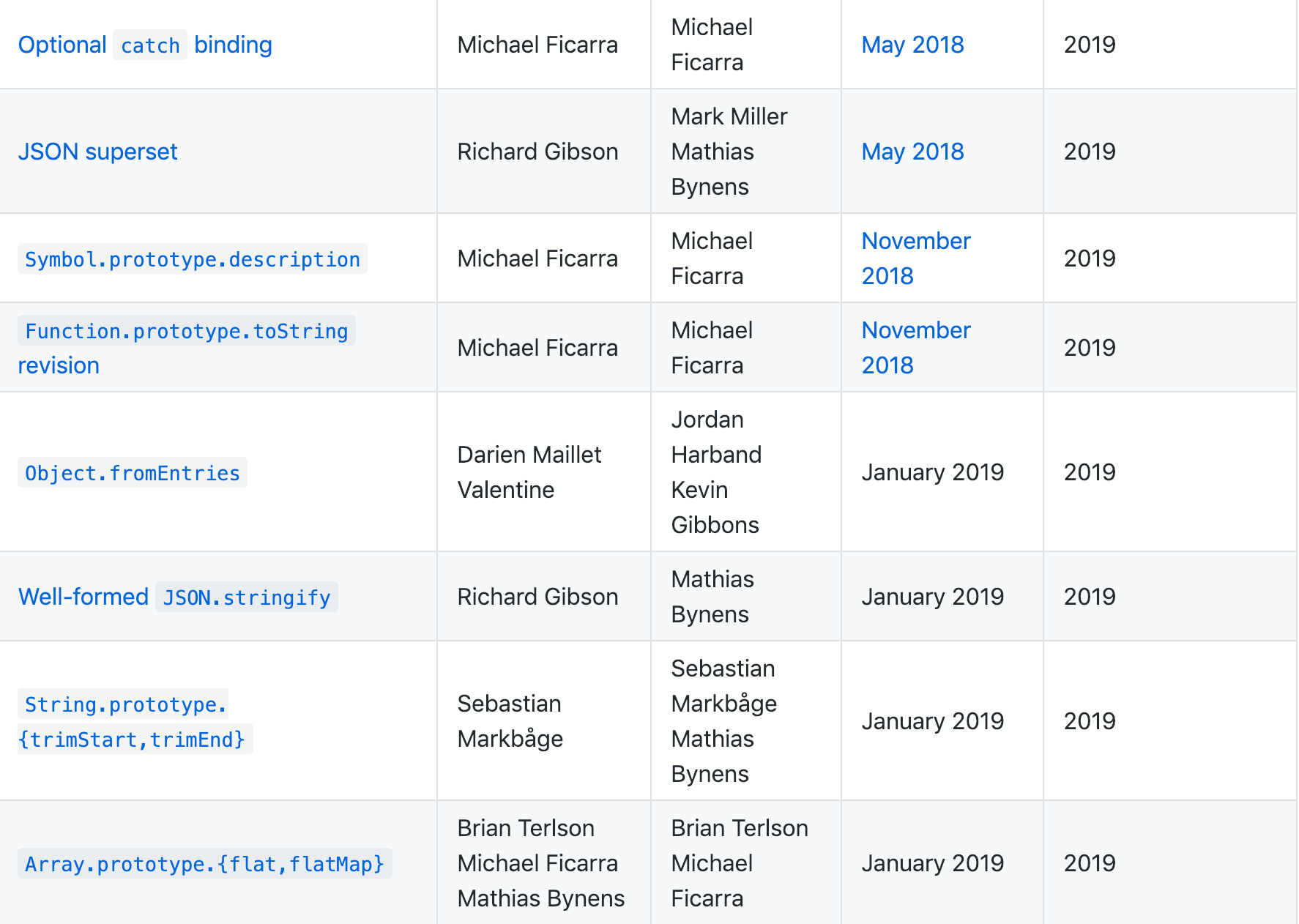ES2019
axuebin opened this issue · 0 comments
ES2019
从表中可以看到已经有多个特性加到了 ES2019 中。
新特性
Optional catch binding
https://github.com/tc39/proposal-optional-catch-binding
将 err 变成 optional 的,可以省略 catch 后的 括号和错误对象:
try {
// tryCode
} catch {
// catchCode
}Previous
之前 try...catch 是这样的:
try {
// tryCode
} catch(err) {
// catchCode
}- tryCode:(必须)尝试执行的代码
- err:(必须)指定局部变量应用的错误
- catchCode:(可选)捕获错误的代码
比如:
try {
throw new Error('报错啦报错啦');
} catch(e) {
console.log(e); // Error: 报错啦报错啦
}有的时候我们只需要捕获错误但是无需知道错误信息,err 就显得没必要的。
JSON superset
https://github.com/tc39/proposal-json-superset
允许 未转义的 U + 2028 行分隔符和 U + 2029 段分割符直接出现在字符串中,不会出现异常。
Previous
之前,JSON的某些字符 \u2028 \u2029 会导致 Javascript 语法错误。
eval('"\u2028"'); // SyntaxError: Unexpected我们的解决方法是对 \u2028 \u2029 进行转义,比如:
str.Replace('\u2028', '\\u2028')Symbol.prototype.description
https://github.com/tc39/proposal-Symbol-description
Symbol.prototype.description | MDN
可以通过 description 方法获取 Symbol 的描述:
const name = Symbol('My name is axuebin');
console.log(name.description); // My name is axuebin
console.log(name.description === 'My name is axuebin'); // My name is axuebinPrevious
我们知道,Symbol 的描述只被存储在内部的 [[Description]],没有直接对外暴露,我们只有调用 Symbol 的 toString() 时才可以读取这个属性:
const name = Symbol('My name is axuebin');
console.log(name.toString()); // Symbol(My name is axuebin)
console.log(name); // Symbol(My name is axuebin)
console.log(name === 'Symbol(My name is axuebin)'); // false
console.log(name.toString()) === 'Symbol(My name is axuebin)'); // true在执行 console.log(name) 的时候也打印了描述信息,是因为这里隐式地执行了 toString(),在代码里这样是不行的。
Function.prototype.toString revision
https://github.com/tc39/Function-prototype-toString-revision
现在 foo.toString() 可以返回精确字符串,包括空格和注释等。
Object.fromEntries
https://github.com/tc39/proposal-object-from-entries
该方法把键值对列表转换为一个对象,可以看作是 Object.entries() 的反向方法。
- Arguments:(Array): 键值对。
- Returns:(Object): 对象。
const arr = Object.entries({ name: 'axuebin', age: 27 });
console.log(arr); // ["name", "axuebin"], ["age', 27]]
const obj = Object.fromEntries(arr);
console.log(obj); // { name: 'axuebin', age: 27 }和 lodash 的 _.fromPairs 具有一样的功能。
const obj = _.fromPairs(['name', 'axuebin'], ['age', 27]);
console.log(obj); // { name: 'axuebin', age: 27 }Well-formed JSON.stringify
https://github.com/tc39/proposal-well-formed-stringify
更友好的 JSON.stringify,对于一些超出范围的 Unicode,为其输出转义序列,使其成为有效 Unicode,
JSON.stringify('\uDF06\uD834'); // '"\\udf06\\ud834"'
JSON.stringify('\uDEAD'); // '"\\udead"'Previous
JSON.stringify('\uDF06\uD834'); // '"��"'
JSON.stringify('\uDEAD'); // '"�"'String.prototype.{trimStart,trimEnd}
https://github.com/tc39/proposal-string-left-right-trim
String.prototype.trimStart() | MDN
String.prototype.trimEnd() | MDN
分别去除字符串前后的空格,生成新的字符串。
const str = ' axuebin ';
console.log(str.trimStart()); // 'axuebin '
console.log(str.trimEnd()); // ' axuebin'
console.log(str); // ' axuebin 'Array.prototype.{flat,flatMap}
https://github.com/tc39/proposal-flatMap
Array.prototype.flatMap() | MDN
还记得这样一道笔试题么,给你一个多维数组,把它拍平!
const arr = [1, [2, [3, [4, [5, 6]]]]];
arr.flat(); // [1, 2, [3, [4, [5, 6]]]]
arr.flat(1); // [1, 2, [3, [4, [5, 6]]]]
arr.flat(2); // [1, 2, 3, [4, [5, 6]]]
arr.flat(3); // [1, 2, 3, 4, [5, 6]]
arr.flat(4); // [1, 2, 3, 4, 5, 6]const arr = [[1, 2, 3], [4, 5]];
arr.flatMap(item => item); [1, 2, 3, 4, 5];是不是很方便...
